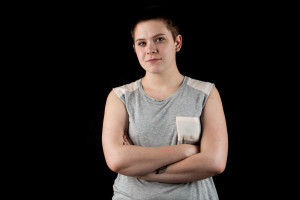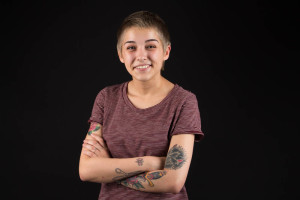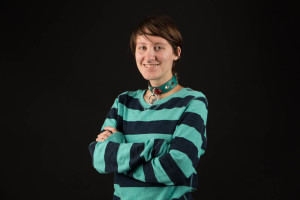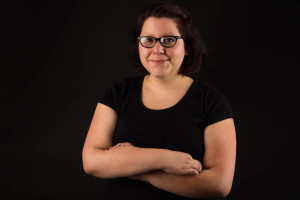Tags
Related Posts
Share This
Glyph First Place Genre Award Winners
The Glyph genre awards have been announced as the publication nears its release on May 3. The 2016 edition submissions are scrupulously judged and selected by professional writers for first through third positions in fiction, poetry and creative nonfiction. Pieces of the most provocative, powerful, meditative, and poignant ilk were selected for first place awards, and it’s no surprise these writers took first place.

Glyph Fiction winner Brianna Neumann. Photo by Jason Stilgebouer.
Two time Glyph author Brianna Neumann won first place in the fiction division for a flash fiction piece about a girl in her 20s who buys a pair of shoes to help her through her father’s funeral. Neumann’s piece plays on her self-described archetypes of “dead people, winter, dead fathers, and whatnot.” The story is constrained between 750-800 words, a typical length for flash fiction.
“What I like about it is that it doesn’t read as a scene. I think people, when they hear ‘flash fiction’ they gravitate towards writing a scene…but this isn’t a scene, it’s a small scene with a meditation in it and I think that’s what makes it successful,” says Neumann. “I think I did more in 750 words than I thought I could do.”
Sophie Farrell, first time Glyph author, won in the poetry division for her prose poem, “Elvis Abramovic,” a work depicting a video recording of one of Elvis’ final performances in the 70s. The video shows Elvis “clearly on a boatload of drugs” trying his best to perform. Farrell describes a childhood obsession she had with Elvis that fed her obsession with the video.

Glyph Poetry winner Sophie Farrell Photo by Jason Stilgebouer.
“He was my all time idol, and I don’t really know why,” Farrell says, “so when I saw that video, obviously it was uncomfortable in a really new way, because that was the person who was on the posters on my wall but now he was like fat and sweaty and crying and kind of losing it.” The poem is constrained in such a way to communicate the sort of fleeting nature of the performance, as if he doesn’t have much left to give. “I felt like if it was more drawn out it wouldn’t be as effective,” says Farrell.
Nonfiction winner and three time Glyph author Melinda Freudenberger won for a experimental lyric essay.
“It’s a piece about Samson, the character from the Bible, and there’s nothing real world or factual about it,” says Freudenberger. “It’s kind of going through a horrific experience with Samson as the person who’s inflicting this experience.” For Freudenberger, what makes the piece a nonfiction piece is its base in her personal life.
“I enjoy writing nonfiction as really fictional, and really abstract.” Freudenberger also experimented with form in the piece, inspired by an essay The Body by Jenny Boully for the addition of footnotes and whitespace. “For me, it was more a piece about form and more about what it looked like on the page. It’s super visual and I like that.”
Glyph’s Best New Voice award, awarded to first time authors in Glyph, was granted to Cris Galvez for a nonfiction abecedarian lyric essay, The Princess, The Pea and The Sun God. An abecedarian essay is one that is arranged alphabetically in some regard, for Galvez, he applied this rule to his section titles. The piece was born from a small writing exercise, but evolved into something more poignant.

Glyph Best New Voice winner Cris Galvez. Photo by Jason Stilgebouer.
“I really liked what I had from that small writing exercise, but didn’t have any idea what I was doing. I thought I’d just write about flowers, bees and about the greek and japanese mythology, and some other stuff,” says Galvez, “but it kind of ended up being about misogyny and how it’s really ugly. I talk about it by giving examples in myths. It’s also about how you can transform, and how things can transform into other things.”
Brianna Neumann, Sophie Farrell, Melinda Freudenberger and Cris Galvez will read in conjunction with all of the second and third place genre winners, at the Glyph Gala at 7 p.m. May 3, in the O’Shaughnessy Performance Space.







 Jackalope Magazine is the student magazine of Santa Fe University of Art and Design. Building on the interdisciplinary nature of our education, we aim to showcase the talent of our university and character of our city.
Jackalope Magazine is the student magazine of Santa Fe University of Art and Design. Building on the interdisciplinary nature of our education, we aim to showcase the talent of our university and character of our city.
0 Comments
Trackbacks/Pingbacks